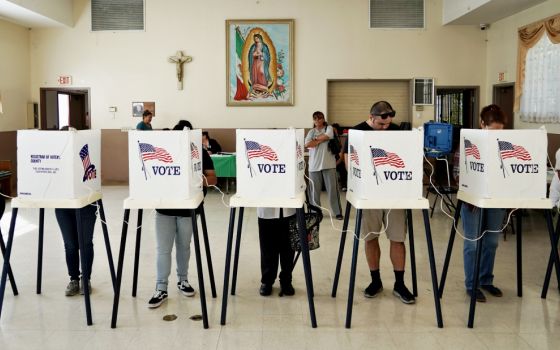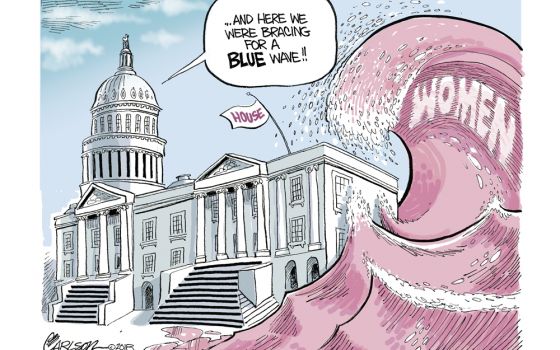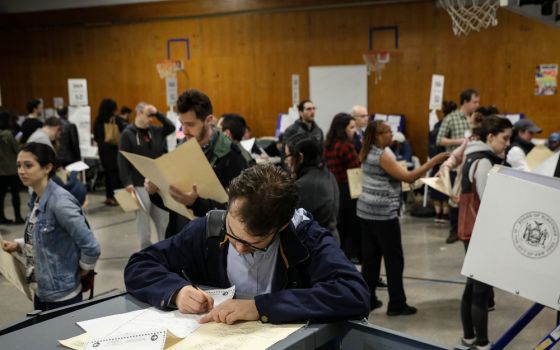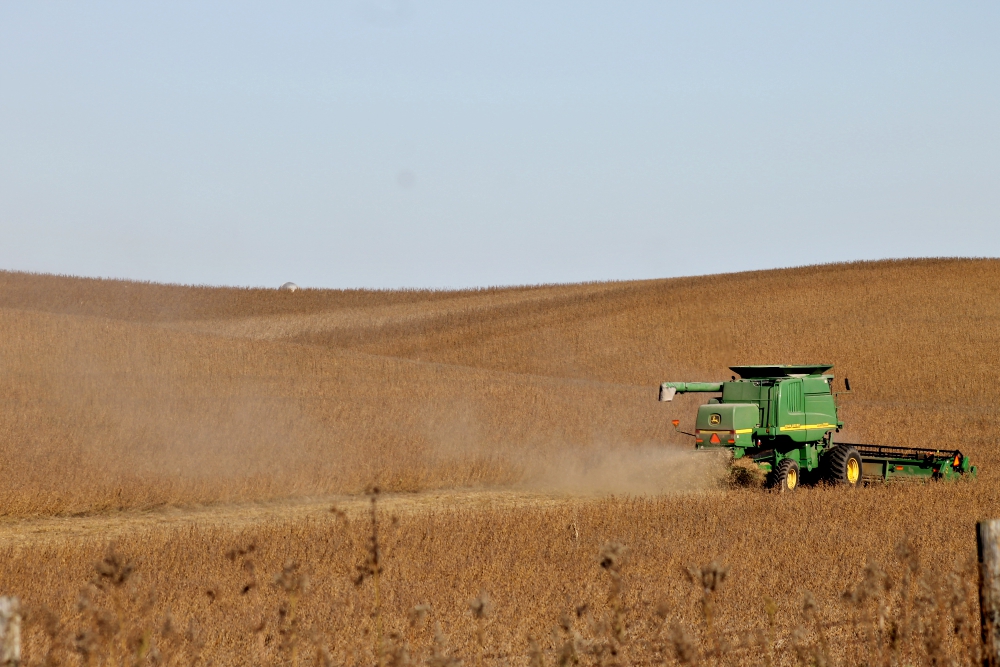
A combine harvests a soybean field Oct. 18 outside Dyersville, Iowa. Soybeans are one of the commodities hit with a tariff from China as part of its ongoing trade dispute with the U.S. (NCR photo/Brian Roewe)
October opened with heavy rains and oversaturated farm fields in this part of northeastern Iowa. Those conditions slowed the fall harvest to a standstill for many farmers, including Dave and Sherry Kronlage.
Typically, the Kronlages, who alone manage their 550-acre family farm where they grow corn and soybeans and raise 6,000 hogs annually, would have harvested about half of their crop by mid-October; by that point this year, about more than three-fourths remained in the fields.
"We're behind this year," he said.
But weather is only one worry for the Kronlages' bottom line.
Farmers in Iowa and other agriculture-heavy states continue to anxiously wait out the trade dispute between the U.S. and China. Beginning in March, the two nations have traded a series of tariffs, with President Donald Trump slapping the import taxes on Chinese steel and aluminum and China responding with duties of its own on more than 120 U.S. products, including pork, ethanol and soybeans.
The trade tit-for-tat has caught Iowa in the middle. In 2017, the state was the country's leading producer of corn and pork and second in soybeans, according to the U.S. Department of Agriculture Economic Research Service, with China alone accounting for 60 percent of all U.S. soybean exports (valued at $14 billion). One in five jobs in Iowa is attached to agriculture, per the Iowa Farm Bureau.
While a majority of people in the 1st District oppose the tariffs, farmers like Kronlage haven't dampened on Trump despite the potential hits farming faces from the trade war.
"You know, farmers are businessmen," he said, inside the kitchen of the house where he was raised, on the farm his family has owned for 130 years. "We know that sometimes things have to get done that aren't too pleasing right now, but in the end, it's going to be a good thing. And so we understand that."
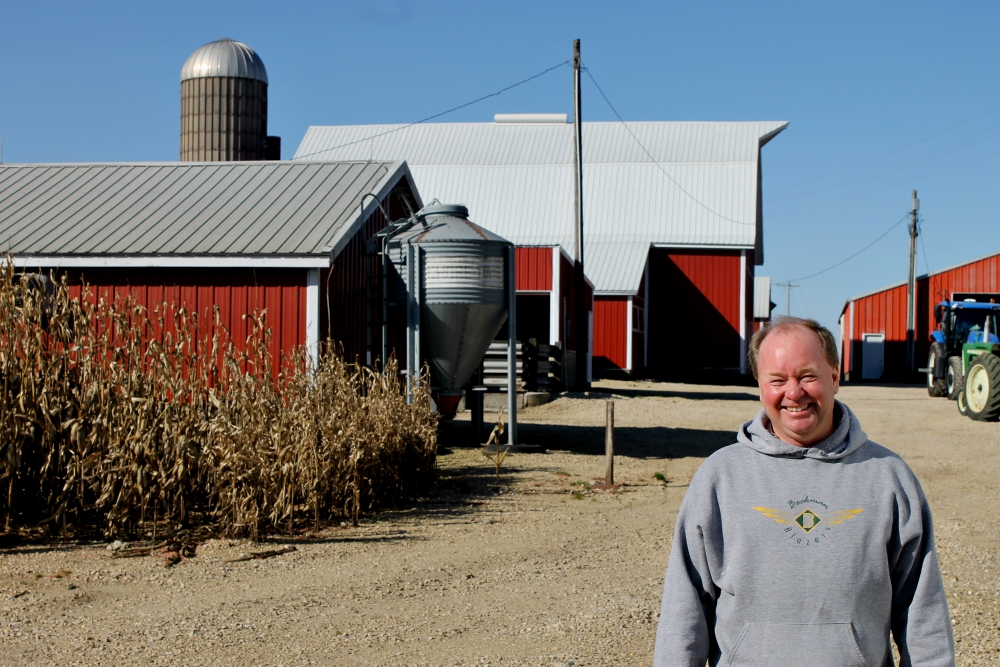
For all but a dozen years of his life, Dave Kronlage has lived on his family's farm in Dyersville, where he and his wife, Sherry, raise roughly 6,000 hogs and farm 550 acres of corn and soybeans annually. (NCR photo/Brian Roewe)
That same willingness is less prevalent in urban areas, where skepticism and outright disapproval of the president is strong, and issues like health care, education, the environment and immigration are motivating people to the polls. The political tension has only grown in recent years, say people who spoke with NCR, muting more conversations in a state where such exchanges have typically been the norm.
The tariffs have been one of the primary issues facing Iowa's 1st District ahead of the 2018 midterms. Both candidates for the House seat, Republican incumbent Rod Blum and Democratic challenger State Rep. Abby Finkenauer, have warned against the impacts of a trade war on Iowa, though Blum is among those with faith Trump can secure better deals.
Along county highways in the 1st District, home to several John Deere factories and the Field of Dreams, political signs outside farms lean toward the two-term representative Blum, including at the Kronlage farm.
Historically, the largely rural district dotted with a few metropolitan spots has displayed political flexibility, voting for Barack Obama in 2008 and 2012 by double digits before narrowly siding with Trump in 2016. Since his election, the district resembles the nation overall in assessing the president's performance — 55 percent disapprove compared to 39 percent approve, according to a New York Times/Sienna College poll in mid-September.
The 1st District House seat has been rated among the most vulnerable to a midterms flip, and election forecasters project it tilting toward Finkenauer.
If elected, Finkenauer would become Iowa's first congresswoman. If she and Alexandria Ocasio-Cortez of New York, both 29, win their congressional seats, they would be the first women under 30 elected to Congress.
Tariffs stir anxiety and debate
The tariffs have stirred anxiety and debate throughout Iowa this summer. The Times/Sienna poll found 55 percent of respondents in the 1st District oppose the tariffs Trump placed on Chinese steel and aluminum that intensified the trade dispute.
While the tariffs remain unpopular overall, they have yet to dent farmers' support for Trump. That could be due to an already-sluggish agriculture economy in recent years blurring the impact. Or the fact the impact is not fully felt yet, as many farmers sold their crop before the tariffs went into effect. That could change if tariffs drag into 2019.
An Iowa State University report in September estimated that Iowa — the nation's No. 2 overall agriculture producer, with an estimated $10 billion in exports — stands to lose as much as $2 billion from the tariffs, with losses hitting soybeans and pork the hardest.
Trump twice stumped this year for Blum, who has supported the president's trade strategy while simultaneously urging patience from farmers and swift resolution from the White House. Finkenauer, in turn, has criticized Trump for starting a trade war on Twitter. She said she supports standing up to China, but it should be done "strategically with a carefully thought out plan" and in a way that doesn't use farmers as "a bargaining chip."
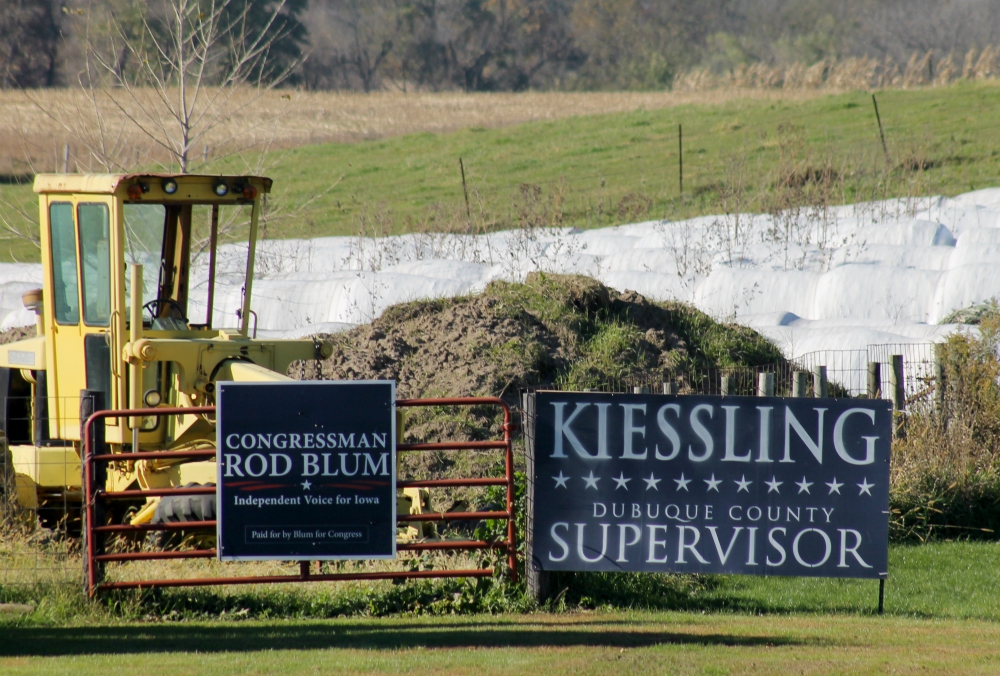
A sign supporting Republican Rep. Rod Blum's re-election to the U.S. House of Representatives is posted on a fence at a farm outside Dyersville, Iowa. (NCR photo/Brian Roewe)
Kronlage, a parishioner at the Basilica of St. Francis Xavier in Dyersville, said he could withstand a drawn-out trade standoff, but acknowledged that younger farmers just getting started would have a much harder time. The Trump administration's recent decision to permit the sale of E15 fuel year-round should be a "big help" to corn growers like him — his full crop is sent across the road to an ethanol plant. So will a short-term "Band-Aid" in the form of $12 billion in tariff relief, including $3.6 billion for soybean farmers, from the U.S. Agriculture Department.
For now, the 57-year-old lifelong farmer said he's willing to give Trump time to make a deal, his confidence reinforced by the renegotiation of the North American Free Trade Agreement with Canada and Mexico.
"Almost every farmer I talk to kind of says the same thing: Let's hold their feet to the fire, and let's see what Trump can get done. And hopefully he can, because the other presidents haven't," he said.
In Bernard, another farming community outside Dubuque, the impacts of the tariffs are noticeable, said dairy farmers Mark and Karen Hosch, who raise more than 150 cows and grow row crops on their 600 acres. Still, they maintain hope that Trump's trade strategy is "going to work very well for us."
"I don't think he threw the tariffs on to hurt the United States. I think he threw them on because we weren't being treated fairly, you know?" Mark Hosch, 57, said.
At the same time, they have mixed feelings about the new NAFTA, formally called the United States-Mexico-Canada Agreement. The pact, still requiring congressional approval, would slightly grow U.S. tariff-free access to Canada's dairy market, from 1 percent to 3.6 percent. Karen Hosch is skeptical whether that expansion will make a difference, while her husband wonders if it's fair to Canadian dairy farmers, who are restricted by quotas on how much they can produce.
Overall, the Hosches, parishioners at Holy Family Catholic Church in Peosta, near the Trappist New Melleray Abbey, are pleased with the president. They approve of the tax cuts, the confirmation of Justice Brett Kavanaugh to the U.S. Supreme Court, and the tough stances he has taken with the United Nations and NATO.
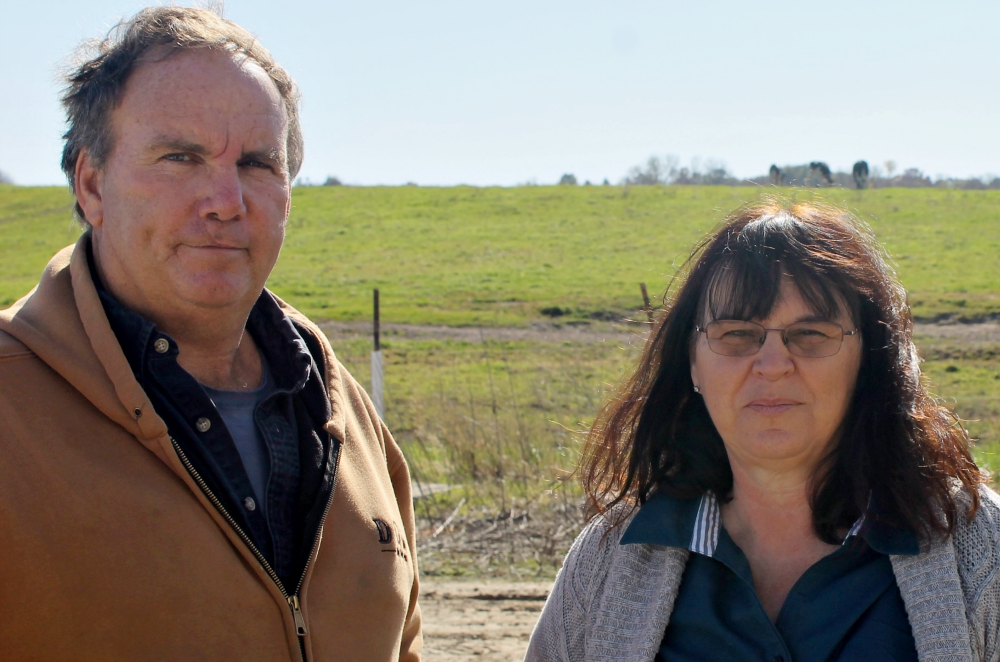
Mark and Karen Hosch raise more than 150 dairy cows and tend to 600 acres of corn and soybeans on their farm in Bernard, Iowa. (NCR photo/Brian Roewe)
"He's not playing the politics game. Yes, he's very rude and crude about some of the stuff he says, but he's getting stuff done that he talked about doing," Karen Hosch, 57, said.
National policies, local impact
Outside its rural corners, issues like health care, education and the Trump tax cuts are factoring into the 1st District race.
At a town hall gathering of 80 people at Mount Mercy University in Cedar Rapids, the Nuns on the Bus rally broke down the Tax Cuts and Jobs Act, which Blum supported. Nuns on the Bus highlighted the economic disparity in the returns to most people compared to the top 1 percent and corporations. To offset the $1.9 trillion the tax cuts are projected to add to the deficit, cuts to programs such as the Supplemental Nutrition Assistance Program, Child Nutrition, and Medicare and Medicaid are being proposed, said Social Service Sr. Simone Campbell.
"This is not good for our nation. It is not good for ordinary folks," the Network executive director said, later emphasizing the need for a "we the people" mentality to catch fire across the country to combat the "unpatriotic lie that we were built on individualism."
For Gail Weitz, she is disappointed that the candidates have not spoken more about immigration. The retired emergency room nurse has worked for years with the immigrant community around Dubuque through Crossing Borders, a faith-based group that formed in the aftermath of the 2008 immigration raids in Postville, Iowa, and advocates for comprehensive immigration reform.
Many of the immigrants came to the region from Guatemala and Mexico to be with family, said Charity Sr. Judy Callahan, who has worked in Hispanic ministry for more than 25 years. They work on farms, in restaurants and at factories, often for low wages, and live in crowded conditions. The majority lack proper legal documents. The Presentation Lantern Center, which since 2002 has assisted immigrants and refugees in a variety of ways, including finding work, learning English and studying for the U.S. citizenship test, estimates that it has helped 2,000 immigrants from nearly 70 countries. So far, 79 have become U.S. citizens.
National policies have had a local impact in that it has become more difficult for unaccompanied minors to obtain juvenile status or apply for green cards, leading to a backup on applications, Callahan said. Catholic Charities recently hired three immigration lawyers to assist.
"They're stacking up and they're not processing people and they're going to put more limitations on those kinds of visas," she told NCR.
Disapproval of Trump's policies on immigration and other issues has led to a lot of fear and anger and exhaustion, members of Crossing Borders said, but also energy to vote and to make sure others do, too. Krissy Juarez, 23, social justice coordinator for the Sisters of Charity of the Blessed Virgin Mary and the Sisters of St. Francis in Dubuque, said many of her friends plan to vote in the midterms.
Advertisement
Cassidy Oberreuter, a junior politics and philosophy major at Loras College in Dubuque, has sensed a similar buzz around the midterms among her peers, particularly after the Kavanaugh hearings. Originally from the small town of Ryan, Iowa, with fewer than 400 residents, she is less focused on farm issues and more on women's rights and mental health. But her primary issue is the environment, favoring federal regulations to limit planet-warming carbon emissions.
Like Oberreuter, Jacob Jansen works on sustainability at Loras and cites Catholic social teaching as influencing how he views issues and candidates. He also places climate change atop his list. He plans to vote for Finkenauer, believing that as a younger candidate she will take the issue more seriously than older members of Congress do currently.
"It's important that we elect people that are going to tackle the issue and think about future generations to come," he said, adding that he prefers candidates who have "a clear vision of the common good for all," especially those on the margins.
Juarez said she is also supporting Finkenauer, who she hopes will be more open to dialogue than Blum has been, and perhaps bring a more "humane approach" to immigration and other issues.
'It's so damn touchy'
While issues may vary across political affiliations, one consistent thing for 1st District voters is that fewer and fewer people are talking with each other about them.
That's a bit of a change for Iowa, a state known nationally for its first-in-the-nation presidential caucuses, as well as reporters' election-year trips to diners, restaurants and fairs to take the pulse of the voting public.
"It's so damn touchy," said Linzy Martin, a retired magistrate judge and secular Franciscan from Strawberry Point, a town of about 1,200 people. "We just avoid it. ... I've noticed that more than I ever have. In the past, yeah, I was talking politics all the time, but it just doesn't work now."
Whether at a local watering hole, at VFW meetings, or in his small Franciscan group, politics used to be a regular topic of discussion. Even with his more conservative friends, Martin, a Democrat, was able to find common ground. Now, any mention of the president and his policies ignites defensive responses and risks decadeslong friendships, he told NCR.
He places the polarization on Trump effectively driving a wedge between people and groups, but also on a sense of "total disconnect" with Washington — that feeling alienated and ignored by their elected representatives has helped facilitate an us-vs.-them mentality.
Illustrating the lack of dialogue, the Nuns on the Bus displayed a cardboard cutout of Blum in lieu of the congressman himself after several failed attempts to arrange a meeting with his office in Cedar Rapids.
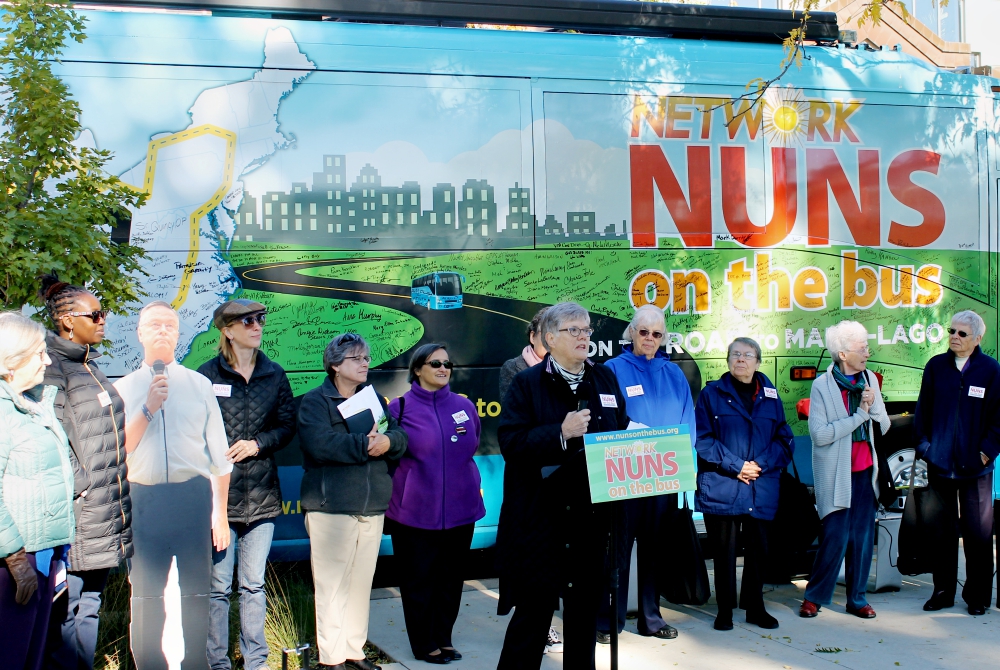
Mercy Sr. Kathy Thornton speaks at a Nuns on the Bus rally in Greene Square in Cedar Rapids, Iowa, Oct. 17. Third from left is a cardboard cutout of Republican Rep. Rod Blum. (NCR photo/Brian Roewe)
"It makes me question what type of relationship does Rep. Blum have with his constituents?" said Mercy Sr. Kathy Thornton, a Cedar Rapids resident and former Network executive director. "How does he know the needs of the people? How can we create effective policy if he does not know his people?"
Callahan, the Charity sister, said it's become harder to engage in political discussions. "You have to figure out what side they're on," she said, adding she never talks politics with her cousin Mark Hosch, the dairy farmer.
"The issues are much more volatile," said Sr. Mary McCauley, a Sister of Charity of the Blessed Virgin Mary and founder of Crossing Borders. The president's approach, she added, "has really brought about a good deal of tension."
For Oberreuter, the Loras student, she finds it easier to talk about the midterms with her friends at college than back home with family who supported Trump. The split is noticeable in how faith shapes views on issues, too. Where she cites Catholic social teaching for her care for creation, the abortion issue dominated how adults she knows decided to vote for Trump, even if they disagreed with him on most other issues.
Despite the lack of conversations, areas of common ground are evident across people who aren't talking with one another.
Of the more than dozen people who spoke to NCR, nearly every one raised concern about a lack of or potentially losing health care. There was also support across political lines for the Supplemental Nutrition Assistance Program, or food stamps, though some expressed the need to make sure it was only temporary aid.
On immigration, the Hosches said they understand why people are leaving their homes in Central America, often fleeing violence and poverty, but agree with the president's crackdown on illegal border crossings, that "there's a right way to come."
Crossing Borders members don't believe in breaking the law, either, McCauley said, but the immigration situation requires a deep examination of whether existing policies constitute a just law, "and how is it helping people and how is it hurting people?"
Last year as a senior at Loras, Juarez helped host an immigration simulation in an effort to address questions of why people don't just enter the U.S. legally. The reenactment included acting out many hurdles facing immigrants and how they're vulnerable to others taking advantage of them. Of the 100 participants, only five became "citizens."
"The response that we got after that was just amazing. ... Telling people the truth, and then hopefully they believe the truth," Juarez said.
Kronlage, who supports enforcing immigration laws, also doesn't want to close the border. He would rather see the U.S. help address the problems in Latin American countries that push people to flee in the first place.
"What do we have to do to help that country get over their problems?" he said of the people currently migrating to the U.S. from Honduras. "Why aren't we there doing something?"
And while he welcomed the Environmental Protection Agency's withdrawal of the Waters of the United States regulation and remains undecided about climate change, he said he is "a real proponent of taking care of what God has given us." On their farm, they're careful of what chemicals they use, practice no-till farming and draw much of their electricity from two rows of solar panels.
He described his family as a "typical Iowa family" with strong feelings on both sides of political issues. To remain a strong family, they've taken talk of politics off the table.
Asked what it would take to have discussions, and civil disagreement, about political issues, "it would take a serious set of ground rules," Kronlage said with a laugh. "And then get people to actually adhere to the ground rules."
[Brian Roewe is an NCR staff writer. His email address is broewe@ncronline.org. Follow him on Twitter: @BrianRoewe.]





